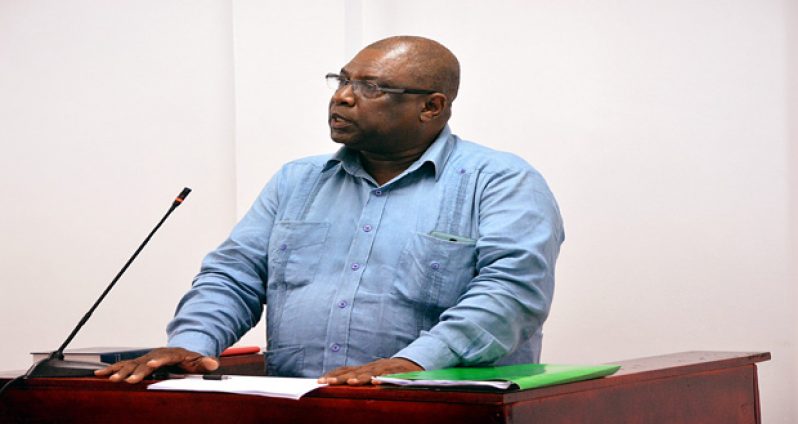PERMANENT Secretary within the Ministry of Tourism, Mr. Derrick Cummings, has said he is strongly against senior ministry personnel displaying behaviours that are inimical and in conflict of interest to the significance of the public service.
Cummings made this comment in a sworn statement when he testified during the ongoing Public Service Commission of Inquiry yesterday.
The PS said he had witnessed a deputy permanent secretary behave in an aggressive manner, which should be unacceptable, and he is now questioning why a deputy permanent secretary or a permanent secretary should feel that he or she has the right to behave that way, and whether or not that individual is to be blamed, or the minister to whom he/she is attached.
“I have seen persons on contracts, perhaps at the level of deputy permanent secretary, who might have displayed behaviour inimical to the best overall interest of the public service,” Cummings confided.
He said he is unsure whether the behaviour springs from the individual’s contractual arrangement with government or because of their affiliation to the powers at the time.
He said that if ministers or permanent secretaries act in conflict with the public’s interest, the senior may be quick to defend himself by arguing that “as a politician elected to serve, what he or she is doing is within the public interest”.
Cummings believes that, though appointing persons outside the public service system may seem to some as an act which undermines the traditional public servant, such appointments should be based on professionalism, merit and ability.
Undermining traditional public servants “could be a disincentive to persons, (and) if that were to happen and the person — perhaps out of the ministry itself or out of the pool of persons eligible within the public servants (among whom) you are looking for special competencies and it’s not there — and the person gets the appointment and performs in ways efficient and respectful, maybe that is something that should be totally dismissed,” he said.
He said he is aware that some permanent secretaries, including himself, are on contractual arrangement with the Ministry, and are not permanent staff who can be classified as public servants.
The fact that employment within ministries is sourced from two extremes — some on contract and others through the traditional public service system -– encourages needful competition.
Asked by the commission if he believes in an arrangement wherein one system of recruitment of PS based on merit is in place, or open competition to allow fresh talent to come into the public service, competing with traditional ones, he said: “Public Service, as the body responsible for implementing government policy, should be equipped with the calibre of people that are professional and can serve based on their merit and their ability; and competition for the position would definitely enhance such an aspiration”.
He said decisions on employment should be the sole responsibility of the President, or someone working close to him, because of the nature of the responsibilities of permanent secretaries.
“The PS is vested with the authority and responsibility to ensure the ministry is efficiently and effectively managed in a way that the human resource is adequately employed and there’s financial propriety. You have misfits and you have highflyers,”
he pointed out.
He also said that in his ministry alone, contract workers far outnumber public servants, and it is a situation which needs to be addressed with time.
“I can’t see a magic bullet or this matter being any revolutionary arrangement, say within a year or so,” he said, adding that even some of the traditional public servants may wish they had a contractual arrangement, since the latter workers receive 22 percent on their earnings over a six-month period as gratuity. However, it was also pointed out by Commissioner Samuel Goolsarran that public servants benefit from long-term security attachments, such as gratuity and pension.
Professor Lutchman cited that some may adopt the saying: “A bird in hand is worth two in the bush” and choose the contractual way, which allows them more cash in hand at payday; and they may be thinking of investing what they have now.
Caption: Mr. Derrick Cummings, Permanent Secretary attached to the Ministry of Tourism, testifying at the Public Service Commission of Inquiry yesterday (Photo by Samuel Maughn)
By Shauna Jemmott




.png)









